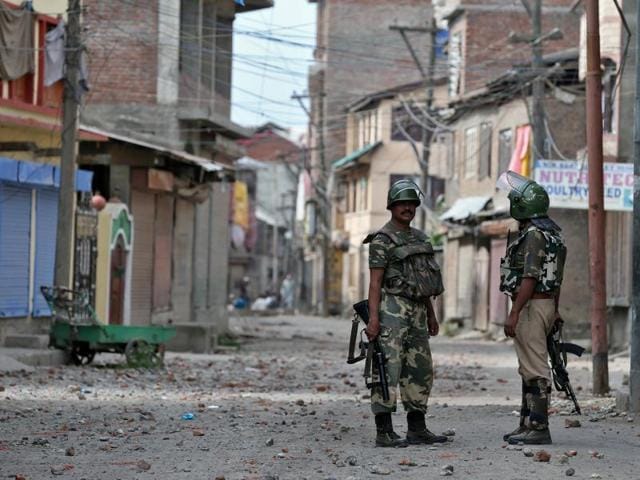Jammu and Kashmir: Three govt employees sacked for involvement with Pakistani-based militant outfits

Jammu and Kashmir: Three govt employees sacked for involvement with Pakistani-based militant outfits
The Jammu and Kashmir government has invoked Article 311 (2) (c) of the Constitution to terminate the employment of three government workers on the grounds of being a “threat to the security of the state.” The decision follows a comprehensive investigation that reportedly revealed their alleged collaboration with Pakistan’s Inter-Services Intelligence (ISI) and various terrorist organizations.
The individuals dismissed from their positions include Faheem Aslam, the Public Relations Officer at Kashmir University, Murawath Hussain Mir from the Revenue Department, and Arshid Ahmad Thoker, a constable in the J-K Police.
According to reports from The Indian Express, the investigation uncovered evidence suggesting that these government employees were involved in activities that posed a significant threat to the state’s security. The collaboration with Pakistan’s ISI and terrorist organizations highlights the seriousness of the allegations against them.
The invocation of Article 311 (2) (c) of the Constitution, which deals with the dismissal of government employees, signifies the government’s commitment to ensuring the safety and security of the state and its residents.
This provision allows for the termination of employees considered to be a threat to the country’s security, thereby protecting the integrity and stability of the region.
Faheem Aslam, the Public Relations Officer at Kashmir University, was influential and had access to sensitive information. Murawath Hussain Mir, from the Revenue Department, played a crucial role in administrative affairs. At the same time, Arshid Ahmad Thoker was a constable in the J-K Police, responsible for maintaining law and order. The involvement of individuals in critical positions underscores the potential gravity of the situation and the importance of the government’s action.
The decision to terminate their employment demonstrates the government’s determination to effectively tackle any threat to national security. By taking swift and decisive action, the Jammu and Kashmir government sends a strong message that collaboration with external forces and engagement in activities detrimental to the state’s security will not be tolerated.

The dismissal of these individuals from their government positions should serve as a reminder to all employees of the importance of upholding the integrity of their roles and working in the state’s best interests. It also underscores the need for ongoing vigilance and comprehensive security measures to identify and address any potential threats within the government apparatus.
According to officials, the dismissed employees faced multiple charges for their alleged involvement with Pakistan-based militant outfits. These charges included assisting militants with logistics, promoting militant ideologies, raising funds for militant activities, and supporting separatist agendas.
Evidence gathered during the investigation supported the government’s decision to terminate their employment. This evidence confirmed that the individuals acted on behalf of the Pakistan Inter-Services Intelligence (ISI) and terrorist organizations.

The charges filed against the employees indicate the gravity of their alleged activities and the threat they posed to the security and stability of the region. By collaborating with Pakistan-based militant outfits, these individuals were accused of participating in activities that could have fueled violence and disrupted peace in Jammu and Kashmir.
The government reflects its commitment to maintaining national security and upholding the rule of law. By citing the evidence gathered during the investigation, the government has underscored the seriousness of the allegations and the necessity to take decisive measures to address the threat posed by such individuals.
The involvement of the Pakistan ISI and terrorist organizations highlights the external influences and potential cross-border implications associated with the alleged activities of the dismissed employees. Such collaboration with external entities poses significant challenges to national security and necessitates swift and stringent action.
The termination of the employees’ positions serves as a clear message that any individual found engaging in activities that compromise the security and integrity of the state will face severe consequences.
It also highlights the government’s commitment to identifying and neutralizing threats to national security, thereby ensuring the safety and well-being of the region and its residents. Officials, as reported by The Indian Express (IE), have described Faheem Aslam, one of the dismissed employees, as a “diehard secessionist” who actively promotes and endorses secessionist ideology. They further alleged that Aslam has served as a key propagandist for terrorists and terrorist outfits in the Kashmir Valley.
According to the officials, Aslam’s social media posts indicate his strong animosity towards the country, often referring to security forces as “Indian Occupational Forces.” These posts, allegedly demonstrating his support for secessionist ideologies, raised concerns about his role and activities within Kashmir University, where he worked as the Public Relations Officer.
Aslam, when approached for comment, stated that he had not been informed about his termination from the services. This indicates a lack of prior communication between the concerned authorities and Aslam regarding the termination decision.
The officials’ characterization of Aslam highlights the seriousness of the allegations against him. Being described as a “diehard secessionist” and a key propagandist for terrorist outfits raises significant concerns about his potential influence and involvement in activities detrimental to the security and stability of the region.

The use of social media to promote anti-national sentiments and support secessionist ideologies is a matter of concern for the authorities. As a public figure holding a position of influence at Kashmir University, Aslam’s alleged activities and the content of his social media posts are significant factors in assessing the potential impact of his actions on the academic environment and broader societal dynamics.
The lack of prior notification to Aslam about his termination raises questions about the communication and procedural aspects of the government’s action. Authorities need to follow due process and ensure that individuals facing such serious allegations are appropriately informed and provided with an opportunity to respond before any decisive action is taken.
The dismissal of Aslam from his position at Kashmir University sends a clear message about the government’s commitment to upholding national security and preserving the integrity of educational institutions. It also underscores the need to thoroughly investigate and address any potential threats arising from the activities and affiliations of employees in sensitive positions.




